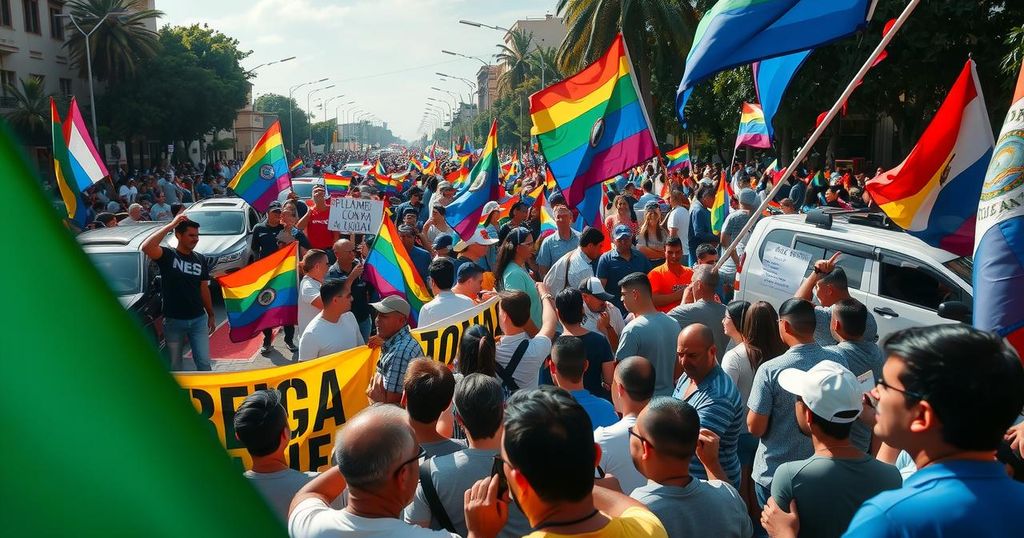Uruguayans Cast Votes in Presidential Run-Off Election, Facing Choice Between Left and Right

Uruguay is currently holding a presidential run-off election with voters choosing between leftist candidate Yamandu Orsi and right-wing Alvaro Delgado. The election is tightly contested, reflecting significant public interest despite challenges regarding crime and economic performance under the current administration. Orsi’s Frente Amplio led the first round with 43.9 percent while Delgado’s coalition garnered substantial support. Both candidates aim to attract undecided voters ahead of the crucial decision.
Voting has commenced in Uruguay’s presidential run-off election, wherein the leftist coalition led by former President Jose “Pepe” Mujica seeks to reclaim power after five years under a right-wing government. The electorate is faced with a choice between the leftist Frente Amplio (Broad Front) candidate Yamandu Orsi and Alvaro Delgado from the National Party, affiliated with the outgoing President Luis Lacalle Pou’s center-right coalition. Polls indicate a closely contested race, potentially with less than 25,000 votes separating the candidates, reflecting a stable political climate in Uruguay compared to sharper divides in neighboring countries.
Polling stations opened at 8am (11:00 GMT) and were set to close at 7:30pm (22:30 GMT), with initial results anticipated two hours post-closure. Orsi, who emphasized maintaining a moderate policy stance, previously garnered 43.9 percent of the votes during the initial round. Delgado, with support from a coalition that includes the conservative Colorado Party, received 26.8 percent, collectively achieving a significant proportion of the electorate. Despite President Lacalle Pou’s 50 percent approval rating, his coalition has encountered challenges regarding its record on crime, notwithstanding achievements in employment and wages.
The two candidates aim to draw the attention of approximately 8 percent of first-round voters who favored smaller parties, in addition to those who abstained in October. Interestingly, neither contender has presented new commitments in the weeks leading up to this decisive election. A televised debate recently held seems to have had negligible impact on voter sentiment, as indicated by commentary from constituents. Attention is focused on whether this election will defy the trend seen globally, where incumbent parties have typically lost voter support due to inflation and escalating living costs.
Uruguay, a country with approximately 3.4 million residents, is currently at a political crossroads as its citizens participate in a presidential run-off election. The leftist Frente Amplio, led by former President Jose Mujica, is seeking to return to governance after a five-year tenure of a right-wing coalition under President Luis Lacalle Pou. The political landscape in Uruguay exhibits less polarization compared to other Latin American nations, with significant interplay between conservative and liberal factions, allowing for a more tranquil election atmosphere. In context, the run-off comes after initial elections which did not yield an outright majority, creating a competitive environment for both major candidates. Economic conditions and public sentiment towards the ruling coalition have a significant influence on voter choices as the electorate navigates concerns over crime and economic stability.
In conclusion, Uruguay’s presidential run-off election presents a pivotal moment for the nation’s political future, offering voters a choice between continuity of the center-right government and a return to leftist leadership represented by Orsi. The election is marked by a notably close race, showcasing the shifting dynamics in voter preferences. As the nation grapples with economic challenges, the outcome may well reflect broader trends affecting incumbent parties globally, thereby shaping not only power dynamics within Uruguay but also its response to future governance challenges.
Original Source: www.aljazeera.com








